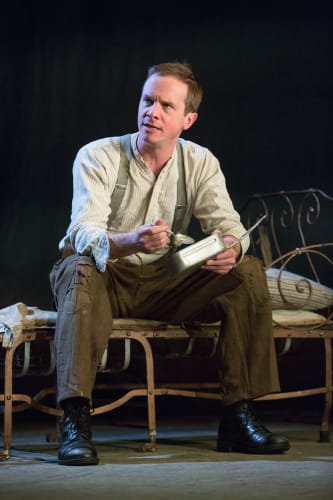World War One. Among the millions killed in the conflict were 306 British soldiers, executed by firing squad for a variety of “offences” (often shell-shock maliciously labelled ‘cowardice’). A campaign, in which Michael Morpurgo’s novel Private Peaceful played a part, led in 2006 to the posthumous pardoning of all these men.
Private Thomas “Tommo” Peaceful is alone in his cell, waiting to face a firing squad at dawn. Rather than sleeping away his final hours, Private Peaceful relives some of the key moments of his "nearly eighteen years of yesterdays and tomorrows".
To be fair, it’s a tough call to hold the attention of an audience of school children (rustling, crackling sweet packets and all) in a space the size of Manchester’s Opera House with a historical monologue. Let it be noted that these students are well-behaved, respectful and attentive; perhaps more than the production deserves.
Paul Chequer, in the title role, works hard throughout, but never quite convinces when re-enacting scenes from Tommo’s boyhood. He isn’t helped in this by the adaptation (by director Simon Reade).
The first rule of dramatic monologue is make it ‘here and now’ not ‘there and then’—put the audience in the immediate presence of the action in order to engage their attention, their imagination, their emotional empathy. How can Chequer make us “see” the young boy he is meant to be playing if his monologue speaks constantly of what happened instead of what is happening?
An experienced adapter of prose, Reade nevertheless also ignores rule two of adaptation—find the dramatic heart of your story and set all else aside. Morpurgo’s novel may, legitimately, linger over the detail of Tommo’s West Country boyhood in the early years of the twentieth century, but a theatre audience needs a drama which drives inexorably towards the unjust execution of an unfortunate young man.
The most memorable moment of the show proves to be incidental to the production. As the recruiting sergeant bellows his challenge on how to respond to the Germans: “shall we beat the livin’ daylights out of ‘em?”, a young voice off to the side of me answers quietly: “no”. Peace in our time?
No sooner has the real drama begun (when older brother Charlie Peaceful manages to sneak the underage Tommo into the army) than the interval arrives.
After the interval, the show picks up. Tommo’s war experience in the ‘land of mud and craters’ allows more active staging and, finally, the minimal props (especially the bed) are used imaginatively to create a sense of action in the trenches (Tommo-the-child makes no use of the set whatsoever). Both actor and director seem more at home with movement than with text (key emotional moments in the narrative continue to pass unmarked, but Chequer’s performance is now more animated and engaging).
In the end, Tommo’s fate is sealed by the vindictive Sergeant Hanley as much as by the inhumanity of the British military establishment (and one is left to ponder the educational value of this for the school parties present).
As six AM strikes, signaling the dawn, Private Peaceful faces his death without panic, and the execution itself is staged elegantly and effectively.
Momentarily, we grieve for Tommo Peaceful’s death, without ever feeling more than passingly acquainted with him. This centenary year will surely offer more powerful and more informative Great War drama than this. Today’s school audience learn little of the conflict, and nothing at all of the power of theatre to inform, entertain, engage and amaze.
